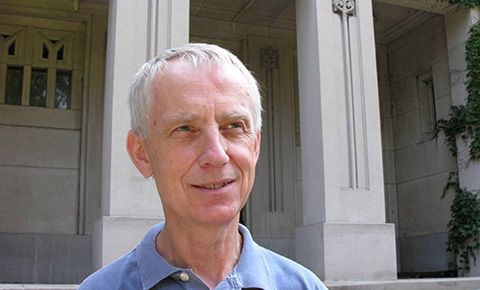Medin Wins $100,000 Rumelhart Prize

Doug Medin, Professor Emeritus at Northwestern University’s School of Education and Social Policy, received the David E. Rumelhart Prize, the most important award in the field of cognitive science.
Awarded annually to a person or team who has made a major contribution to the theory of how humans think, the prize includes a custom bronze medal, a certificate, and $100,000.
Medin, the Louis W. Menk Professor Emeritus of Psychology and Professor Emeritus of Education and Social Policy, was trained as a psychologist and is best known for studying how people understand and sort ideas.
He introduced the exemplar model of category learning, which suggests that we learn to group things by remembering specific examples, rather than comparing them to one perfect example (which is what the prototype theory said).
Along with Gregory Murphy, Medin argued that psychological models of concepts should go beyond just grouping things—they should also explain how concepts help us understand and make sense of the world.
He has also explored how expertise and culture shape the way people think about categories, especially in biology. In more recent work, often collaborating with Professor Megan Bang, he focused on how different cultures understand and use concepts.
Medin is the second Northwestern professor to receive the prize, joining one of his frequent collaborators, Dedre Gentner, who won the prize in 2016.
"Doug Medin is a towering figure in the study of human cognition," Gentner said. "He is not only a powerful thinker but a delightful colleague."
Consistency in contradiction
Medin, who grew up in Moorhead, Minn., graduated from Moorhead State College (currently Minnesota State University, Moorhead) where he was active in the Civil Rights movement. In 1968, he received his doctorate in psychology at the University of South Dakota just three years after graduating from college. His doctoral thesis focused on how Rhesus monkeys perceive shapes.
Medin arrived at Northwestern in 1992 after working at the University of Michigan and the University of Illinois Urbana-Champaign. He chaired the psychology department in the Weinberg College of Arts and Sciences between 1994 and 1998.
A member of several highly respected societies, including the American Academy of Arts and Sciences, the National Academy of Sciences and the National Academy of Education, Medin is known for going against the current, according to a 2005 essay Douglas L. Medin, His Life, and His Intellectual Heritage published by the American Psychological Association.
“Doug shines the light where others aren't looking, then moves it when others start looking where he was just shining it,” his colleagues noted in the piece. “In a similar vein, Medin sees consistency in what appears to be contradiction.”
Gentner noted that Medin has done seminal work in in three important arenas: the nature of human concepts and categories, the processes of similarity and analogy, and his current major focus, the study of how culture and cognition interact to shape human thinking and human society.
"I was lucky enough to collaborate with Doug on the second of these—similarity and analogy—along with grad students Rob Goldstone and Art Markman, who’ve gone on to make substantial contributions," she said. "It was one of the high points of my research life—it felt like every week another insight would spring up from our discussions."
Medin has been editor of the journal Cognitive Psychology, co-authored four editions of a Cognitive Psychology textbook, and is co-author of several books. In Who’s Asking: Native Science, Western Science, and Science Education, Medin and Bang argue that having scientists from different cultural backgrounds brings fresh ideas and leads to better science and teaching.
Medin has also served on three National Research Council committees – one on informal science learning, one on broadening psychological research to include culture, and one on how people learn.
He has also received a Guggenheim fellowship, a James McKeen Cattell fellowship, the American Psychological Association distinguished scientific contribution award, the APS William James lifetime achievement award and the Society of Experimental Psychologists Norman Anderson lifetime achievement award.
Teamwork and collaborations have played a central role in Medin’s research. In addition to Gentner and Bang, key collaborators include Edward E. Smith, Scott Atran, Sandra Waxman, Karen Washinawatok (Menominee), as well as many graduate students and postdoctoral fellows.
“It’s not that he had a great career, it’s that he transformed the field,” Bang said during a faculty meeting. "Doug has changed his ideas in pretty significant ways to the point he has critiqued his own original ideas. He's someone who has learned across the lifespan."
The David E. Rumelhart Prize is funded by the Robert J. Glushko and Pamela Samuelson Fund.